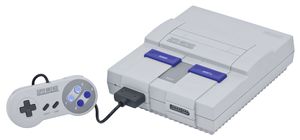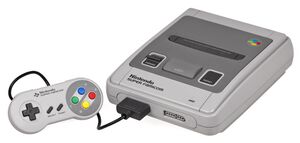Difference between revisions of "Super Nintendo Entertainment System"
Jump to navigation
Jump to search
| Line 1: | Line 1: | ||
| − | The '''Super Nintendo Entertainment System''' (also known as the '''Super NES''', '''SNES''' or '''Super Nintendo''') is a [[16-bit]] [http://retroconsoles.wikia.com/wiki/Category:Console video game console] that was released in 1990 by [[Nintendo]] in Japan, 1991 in North America, 1992 in Europe & Australasia (Oceania), and South America in 1993. In Japan, the system is called the '''Super Famicom''' <span style="font-weight: normal">(スーパーファミコン<sup>[http://en.wikipedia.org/wiki/Help:Installing_Japanese_character_sets <span class="t_nihongo_icon" style="color: #00e; font: bold 80% sans-serif; text-decoration: none; padding: 0 .1em;">?</span>]</sup>, officially adopting the abbreviated name of its predecessor, the Family Computer)</span>, or '''SFC''' for short. In South Korea, it is known as the '''Super Comboy''' (슈퍼 컴보이) and was distributed by Hyundai Electronics. | + | [[File:SNES-Model1-Console-Set.jpg|thumb|Original North American Model 1 (1991–1997)]][[File:Super-Famicom-Console-Set.jpg|thumb|Original Japanese version (1990–1998)]]The '''Super Nintendo Entertainment System''' (also known as the '''Super NES''', '''SNES''' or '''Super Nintendo''') is a [[16-bit]] [http://retroconsoles.wikia.com/wiki/Category:Console video game console] that was released in 1990 by [[Nintendo]] in Japan, 1991 in North America, 1992 in Europe & Australasia (Oceania), and South America in 1993. In Japan, the system is called the '''Super Famicom''' <span style="font-weight: normal">(スーパーファミコン<sup>[http://en.wikipedia.org/wiki/Help:Installing_Japanese_character_sets <span class="t_nihongo_icon" style="color: #00e; font: bold 80% sans-serif; text-decoration: none; padding: 0 .1em;">?</span>]</sup>, officially adopting the abbreviated name of its predecessor, the Family Computer)</span>, or '''SFC''' for short. In South Korea, it is known as the '''Super Comboy''' (슈퍼 컴보이) and was distributed by Hyundai Electronics. |
==Hardware== | ==Hardware== | ||
| + | |||
| + | {| class="table" style="width:23em;font-size:90%;text-align:left;" | ||
| + | ! colspan="2" style="text-align:center; borders=1; "|CPU reference | ||
| + | |- | ||
| + | |'''Processor'''||Ricoh 5A22, based on a 16-bit 65c816 core | ||
| + | |- | ||
| + | |'''Clock rates''' (NTSC)||''Input:'' 21.47727 MHz<br />''Bus:'' 3.58 MHz, 2.68 MHz, or 1.79 MHz | ||
| + | |- | ||
| + | |'''Clock rates''' (PAL)||''Input:'' 21.28137 MHz<br />''Bus:'' 3.55 MHz, 2.66 MHz, or 1.77 MHz | ||
| + | |- | ||
| + | |'''Buses'''||24-bit and 8-bit address buses, 8-bit data bus | ||
| + | |- | ||
| + | |'''Additional features''' | ||
| + | | | ||
| + | *DMA and HDMA | ||
| + | *Timed IRQ | ||
| + | *Parallel I/O processing | ||
| + | *Hardware multiplication and division | ||
| + | |} | ||
==Add-ons== | ==Add-ons== | ||
Revision as of 06:29, 29 May 2013
The Super Nintendo Entertainment System (also known as the Super NES, SNES or Super Nintendo) is a 16-bit video game console that was released in 1990 by Nintendo in Japan, 1991 in North America, 1992 in Europe & Australasia (Oceania), and South America in 1993. In Japan, the system is called the Super Famicom (スーパーファミコン?, officially adopting the abbreviated name of its predecessor, the Family Computer), or SFC for short. In South Korea, it is known as the Super Comboy (슈퍼 컴보이) and was distributed by Hyundai Electronics.
Hardware
| CPU reference | |
|---|---|
| Processor | Ricoh 5A22, based on a 16-bit 65c816 core |
| Clock rates (NTSC) | Input: 21.47727 MHz Bus: 3.58 MHz, 2.68 MHz, or 1.79 MHz |
| Clock rates (PAL) | Input: 21.28137 MHz Bus: 3.55 MHz, 2.66 MHz, or 1.77 MHz |
| Buses | 24-bit and 8-bit address buses, 8-bit data bus |
| Additional features |
|

